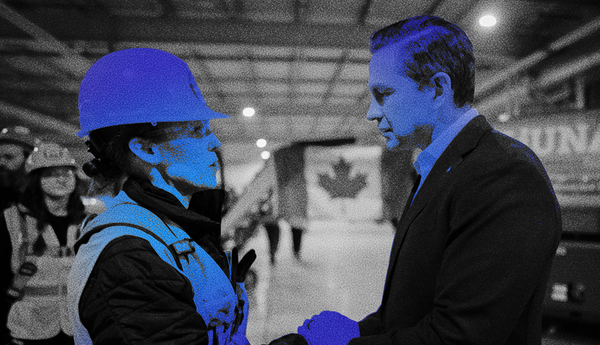After months of uncertainty, international graduates from Canadian universities found out Friday that they would have their post-graduation work permits (PGWPs) extended.
An April 22 announcement from Immigration, Refugees and Citizenship Canada (IRCC) promised that former international students with work permits set to expire in 2022 would be able to get an 18-month extension, “so they can continue to gain work experience and have a better chance at qualifying for permanent residency.”
In a statement, Minister Sean Fraser said:
“Immigration will be crucial to easing our labour shortage, and these measures aim to address pressing needs in all sectors across the country, while providing more opportunities for recent graduates and other applicants to build their lives in Canada and continue contributing to our short-term recovery and long-term prosperity.”
The news comes as a relief for many former international students.
In September 2021, Canada abruptly stopped draws for the Canadian Experience Class (CEC) stream of permanent residency, which is based on applicants having work experience within Canada.
As PGWPs are normally not extendable — and access to a bridging work permit relies on receiving an invitation to apply for permanent residency — graduates with expiring work permits were facing the prospect of losing their ability to work in Canada, being forced to leave their jobs or perhaps even the country due to circumstances beyond their control.
The IRCC announcement notes that 95,000 PGWPs were due to expire in 2022, and estimated 50,000 people would be helped by the extension.
'Extensions to temporariness'
Sarom Rho, national coordinator for Migrant Students United and an organizer for Migrant Workers Alliance for Change, said student activism helped push Fraser into making a decision.
“Migrant student worker organizing has forced him to announce a renewable work permit," Rho told The Maple. "That’s impacted and essentially stopped the mass deportations of 50,000 former international students in Canada."
But the announcement wasn’t perfect. In 2021, the IRCC announced work permit extensions for former students whose permits expired between January 27 and November 27, 2021.
The new program only captures students whose permits expire between January 31 and December 31 2022, leaving workers whose permits expired at the end of 2021 or in early January 2022 excluded due to what Rho described as an “arbitrary timeline.”
Rho said there are 1.6 million migrant and undocumented people in Canada, or around one in 23 people in Canada’s total population. She pointed to larger systemic problems that will make it difficult for graduates to access permanent residency.
Express Entry draws are due to resume in July. This will include the CEC stream and the Federal Skilled Worker (FSW) stream, which has been paused since December 2020.
The FSW program allows immigrants from outside of Canada to apply for permanent residency, meaning they can enter the country already with the permanent residency status that temporary workers currently within Canada lack.
The February 2022 Immigration Levels Plan shows 55,900 planned "Federal High Skilled" admissions, down from the 110,500 admissions for 2022 listed in the 2021 Immigration Levels Plan. This means the draws are going to be more exclusive, as all express entry candidates are competing for a limited number of permanent residency spots.
Halving the number of spots “essentially made it two times harder for migrant student workers to get permanent residency,” said Rho. They also point out that many current and former international students do essential work, but permanent residency demands that applicants have work in certain employment categories.
Low-wage, essential work does not count as “work” for skilled worker permanent residency applications, nor does self-employed labour, gig work or any employment that lasts less than a year.
“We don’t need extensions to temporariness,” said Rho. “We need, fundamentally, permanent resident status for all as a way to ensure equal rights and protections.”
'Slower than molasses in Siberia'
Catherine Sas, an immigration lawyer based in Vancouver, said the fact that the government even bothered to extend work permits is something to be thankful for.
“It’s not perfect, but it’s much better than they have responded to issues in the past,” she told The Maple. “Compared to how the government usually works, which is slower than molasses in Siberia, I think that overall they’ve been fairly decent.”
In her experience as an immigration lawyer, Sas said usually the federal government does little to nothing to help immigrants facing difficult situations.
“With the ongoing demand for people who want to immigrate here, it gives our government a certain level of arrogance that we’re not here to help all people,” she said.
In an email, an IRCC communications officer told The Maple that the government had introduced short-term programs due to “compelling reasons,” noting that the 2021 work permit extension was “intended to address the loss of work opportunities” and that the 2022 extension “recognizes the fact that Express Entry rounds of invitations have been paused.”
The email stated that PGWPs who wanted their permits extended must “be in Canada when this public policy comes into effect, and remain in Canada with valid temporary status.”
However, the officer also noted, “Many [PGWP holders] may also have left the country,” implying that graduates who did leave the country when their work permits expired would not be eligible for an extension.
The IRCC did not address questions about why there was a gap for graduates whose permits expired between November 2021 and January 2022, nor whether there was a plan for helping temporary residents who may continue to see delays in reaching the points threshold for permanent residency due to the changes in draws.
When asked about gaps in the announcement, Sas noted that immigration policy has a habit of being exclusionary.
“There’s also numerous adages you could refer to. Life’s not fair. We can’t be all things to all people,” she said. “It’s not going to be a panacea for absolutely everybody.”
'Mental and emotional toll'
Eleanor Tremeer, a British freelance writer and editor living in Vancouver, is one of the many temporary workers in Canada who is not directly helped by the immigration announcement.
They have been in Canada since 2020 on an International Experience Class (IEC) visa, a two-year permit that allows citizens from certain countries to be able to live and work in Canada.
Many IEC holders use it as a way to find a job in Canada, enabling them to apply for permanent residency. But the long pause on PR draws means many people have seen their permits expire before they’ve had a chance to receive an invitation to apply.
“For anyone who is trying to stay in the country, anyone whose visa is expiring, people’s lives have been incredibly impacted,” Tremeer told The Maple.
They face an added problem because they are self-employed. While they work full time, the lack of “employee” status means this work does not count towards earning permanent residency points for either the FSW or CEC pathways.
“In the midst of the gig economy, a lot of young creative workers tend to freelance so that they can do what they’re most skilled in,” they said. “And the Canadian immigration program just has not updated to reflect the reality of the situation for many professionals living and working in Canada.”
The government’s focus on using immigrant labour to help economic recovery also strikes Tremeer as paradoxical.
Canada is “bringing immigrants in for cheap labour, but then they don’t actually give those same immigrants the right to have permanent residency status, because they don’t value those kinds of jobs,” they said.
As a result, temporary workers are forced into a state of limbo, not knowing if they’ll have enough points to make the crowded permanent residency draws, not knowing if they’ll be able to extend work permits, not knowing if losing worker status means they should leave the country entirely or burn through savings to stay as a visitor in the hope of something changing.
“How can you have any kind of employment if you’ve got that threat of instability looming over you? How can you sign for an apartment?,” Tremeer said.
“In addition to the horrible feeling of being kicked out of a country that you have lived in perfectly happily, contributed to the economy, paid your taxes … then having to live in uncertainty, it takes a great mental and emotional toll on you.”
While Tremeer has been able to apply for a second IEC visa that should allow them to stay for another two years, the IRCC’s opaque system means they don’t know what their status is and if they will be granted the new permit before their current one expires.
Tremeer notes that they have various privileges, as a white migrant with a university education, previous work experience outside of Canada and English as a first language.
“If I’m struggling, it must be even more difficult for probably the majority of people who immigrate to Canada,” they said. “So it feels pretty aggravating when the Canadian government does a lot of announcements saying they really want a lot of immigrants, when we know that the reality of the situation is that they don’t actually care about the welfare of those immigrants.”
“They don’t see us as people. They see us as numbers on a spreadsheet.”
Temporary workers must wait until July to see what the permanent residency draws look like, and it will take months after that to get a sense of how point requirements will change. Some may still be unable to meet point thresholds depending on how high they remain — adding to the layers of uncertainty.
For Rho, the answer is to abolish temporary residency entirely.
“We need a single tier immigration system, which is to ensure everybody who comes into the country arrives with permanent resident status on landing, and everybody who is already here is given permanent resident status immediately,” she said. “What we need is action.”
V. S. Wells is a freelance journalist originally from the U.K. and currently living on unceded Musqueam, Squamish and Tsleil-Waututh territory in Vancouver, B.C. Their bylines include Passage, VICE, the Toronto Star, Slate, The Tyee and Xtra Magazine.







